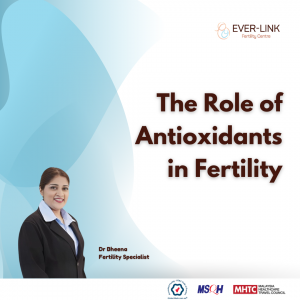
Antioxidants are substances that protect our cells from damage caused by oxidative stress, a condition that occurs when there’s an imbalance between free radicals and antioxidants in the body. While antioxidants are commonly associated with general health and aging, they also play a significant role in fertility. This article discusses how antioxidants can positively influence reproductive health and fertility in both men and women, backed by scientific evidence.
- Oxidative Stress and Its Impact on Fertility
Oxidative stress occurs when the body’s natural defense system, which includes antioxidants, is overwhelmed by free radicals. Free radicals are highly reactive molecules that can damage cells, including reproductive cells. For women, oxidative stress can negatively impact egg quality, while for men, it can impair sperm quality and motility. A study in Fertility and Sterility (2018) showed that oxidative stress is a major contributor to age related declines in both male and female fertility. For women, oxidative stress can damage the eggs, reduce the chances of fertilization, and even lead to early miscarriage. A study in The Journal of Clinical Endocrinology & Metabolism (2019) demonstrated that women with higher levels of oxidative stress had a lower rate of successful IVF implantation. This suggests that oxidative damage may be one reason why women struggle to conceive as they age.
- Antioxidants and Male Fertility
For men, antioxidants play an essential role in sperm health. Free radicals can attack sperm DNA, reducing sperm count, motility, and causing DNA fragmentation, all of which can lead to male infertility. A study in Andrology (2017) found that men who consumed higher levels of antioxidants had better sperm motility and fewer DNA fragments in their sperm. Antioxidants such as vitamin C, vitamin E, zinc, and selenium can neutralize these free radicals, protecting sperm from damage. A clinical trial published in The American Journal of Clinical Nutrition (2015) demonstrated that antioxidant supplementation improved sperm quality in men with low sperm count.
- Diet and Lifestyle for Antioxidant Boost
To maximize fertility, both men and women should aim to include antioxidant rich foods in their diet. These include berries, nuts, dark chocolate, leafy greens, and foods high in vitamins C and E. In some cases, antioxidant supplements might be recommended by doctors to help individuals with low antioxidant levels.
Conclusion
Antioxidants play a critical role in reducing oxidative stress and protecting reproductive health. For both men and women, incorporating antioxidant rich foods and supplements into a healthy lifestyle can improve fertility and support the body’s natural defense system against free radical damage. For couples facing infertility, focusing on antioxidant intake can provide an additional strategy to enhance reproductive success.

